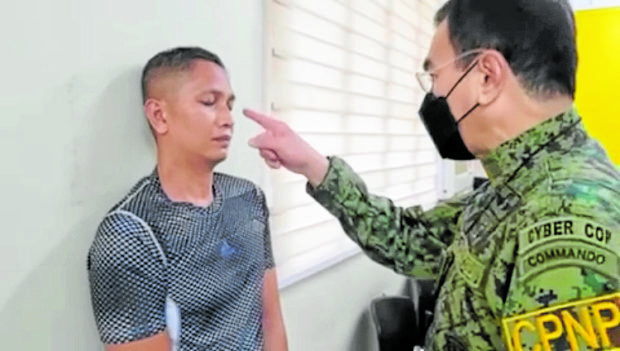Zinampan case: NUPL lauds Eleazar for admitting what’s wrong with PNP

YOU’RE FACING THE MUSIC Hours after the on-camera killing, National Police Chief General Guillermo Eleazar confronts Police Master Sergeant Hensie Zinampan and promises to personally oversee both criminal and administrative processes against the trigger-happy cop. FILE/PNP PHOTO
MANILA, Philippines — It’s reassuring to hear the Philippine National Police (PNP) chief speak openly about the problem that exists within his organization – rather than brush off – after another police officer was caught on video killing an unarmed civilian, a lawyers’ group said.
National Union of People’s Lawyers (NUPL) said Gen. Guillermo Eleazar opening up to the possibility of conducting neuropsychiatric tests on policemen is a distinction from previous police chiefs who would insist that such crimes are isolated.
Eleazar advocated neuropsychiatric testing every three years, in addition to providing mental health assistance, in the aftermath of Police Mst. Sgt. Hensie Zinampan’s shooting to death of a 52-year-old woman in Quezon City while he was intoxicated.
“You have to give it to the guy. Even on its face, this apparent openness and humility to admit that there is a problem and to explore solutions suggested by others are refreshing,” NUPL President Edre Olalia said on Friday.
“It is a remarkable departure and hopefully not a mere aberration from the usual isolated ‘rogue cops’ excuse and even from the routinary denial and justification,” he added.
Article continues after this advertisementREAD: PNP eyes neuropsychiatric tests for cops every 3 years
Article continues after this advertisementZinampan and the husband and son of victim Lilybeth Valdez had a prior feud, according to reports. The cop appeared inebriated when he fired his weapon at Valdez, who had just purchased cigarettes from a neighboring sari-sari store.
READ: ‘Drunk’ cop arrested after shooting woman dead in QC
The killing enraged Eleazar, who was focused on cleansing the police force internally. Zinampan will face murder charges and administrative charges, and he will be fired, said the police chief.
WATCH: PNP chief Eleazar berates cop who shot woman dead in QC
READ: Cop who shot woman dead in QC to face murder, admin raps – Eleazar
Even critical groups, like NUPL, lauded Eleazar’s efforts but questioned why rigorous neuropsychiatric testing would only take place after officers were hired rather than before.
“Yet, should it not have started during the screening, recruitment, and training before deploying them on the beat instead of waiting for such abominable excesses to happen time and time again?” Olalia asked.
“Beyond these, of course, is the need to abandon the institutional, legal, and political drivers that enable and engender the attitude of impunity for excesses of power,” he added.
Neuropsychiatric testing is undertaken throughout the recruitment process, according to Eleazar in a recent interview, although the PNP is trying to apply the Armed Forces of the Philippines’ neuropsychiatric assessment period of every three years.
NUPL observed, however, that political and institutional factors, as well as psychological assessments and awareness, may need to be considered.
“When citizens are now always scared and distrustful rather than feel safe and protected when they see cops who not only think they are above the law but are the law, then it is high time to look beyond neuro-psychiatric assessment and tests and decisively have a political assessment and institutional reorientation as well,” Olalia said.
Police officers have been encouraged to seek neuropsychiatric evaluations before. Former PNP head and now-Senator Ronald dela Rosa urged that the exams be held more frequently in the wake of the December 2020 massacre of two of his neighbors in Paniqui, Tarlac, by Parañaque officer Jonel Nuezca.
READ: After Tarlac shooting, Bato bats for regular neuropsychiatric tests for cops